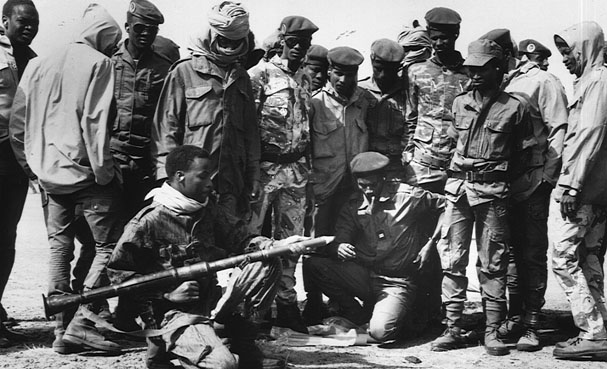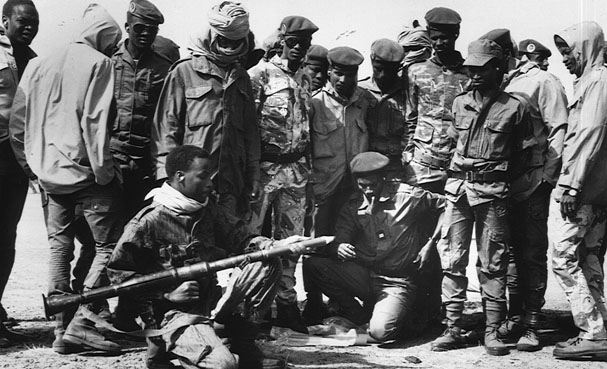This post discusses the political history of Chad from the pre history down to the colonization and further to the independence or decolonization of Chad.
Chad officially the Republic of Chad, is a landlocked country in Central Africa. It borders Libya to the north, Sudan to the east, the Central African Republic to the south, Cameroon and Nigeria to the southwest, and Niger to the west. Due to its distance from the sea and its largely desert climate, the country is sometimes referred to as the “Dead Heart of Africa”.

PRE-HISTORY
During the 7th millennium BC, the northern half of Chad was part of a broad expanse of land, stretching from the Indus River in the east to the Atlantic Ocean in the west, in which ecological conditions favored early human settlement. Rock art of the “Round Head” style, found in the Ennedi region, has been dated to before the 7th millennium BC and, because of the tools with which the rocks were carved and the scenes they depict, may represent the oldest evidence in the Sahara of Neolithic industries. Many of the pottery-making and Neolithic activities in Ennedi date back further than any of those of the Nile Valley to the east.
Read: POLITICAL HISTORY OF ZAMBIA
In the prehistoric period, Chad was much wetter than it is today, as evidenced by large game animals depicted in rock paintings in the Tibesti and Borkou regions.
16TH TO THE 19TH CENTURY
The most important of these states, Kanem-Bornu, which was at the height of its power in the later 16th century, owed its preeminence to its command of the southern terminus of the trans-Saharan trade route to Tripoli.
Products of the Islamized Sudanic culture diffused from Kanem were the kingdoms of Bagirmi and Ouaddaï, which emerged in the early years of the 17th century out of the process of conversion to Islam. In the 18th century the Arab dynasty of Ouaddaï was able to throw off the suzerainty of Darfur and extend its territories by the conquest of eastern Kanem. Slave raiding at the expense of animist populations to the south constituted an important element in the prosperity of all these Muslim states. In the 19th century, however, they were in full decline, torn by wars and internecine feuds. In the years 1883–93 they all fell to the Sudanese adventurer Rābiḥ az-Zubayr.
COLONIALISM (1900–1940)
The French first invaded Chad in 1891, establishing their authority through military expeditions primarily against the Muslim kingdoms. The decisive colonial battle for Chad was fought on April 22, 1900 at Battle of Kousséri between forces of French Major Amédée-François Lamy and forces of the Sudanese warlord Rabih az-Zubayr. Both leaders were killed in the battle.
In 1905, administrative responsibility for Chad was placed under a governor-general stationed at Brazzaville, capital of French Equatorial Africa (FEA). Chad did not have a separate colonial status until 1920, when it was placed under a lieutenant-governor stationed in Fort-Lamy (today N’Djamena).
DECOLONIZATION/ INDEPENDENCE (1940–1960)
During World War II, Chad was the first French colony to rejoin the Allies (August 26, 1940), after the defeat of France by Germany. Under the administration of Félix Éboué, France’s first black colonial governor, a military column, commanded by Colonel Philippe Leclerc de Hauteclocque, and including two battalions of Sara troops, moved north from N’Djamena (then Fort Lamy) to engage Axis forces in Libya, where, in partnership with the British Army’s Long Range Desert Group, they captured Kufra. On 21 January 1942, N’Djamena was bombed by a German aircraft.
After the war ended, local parties started to develop in Chad. The first to be born was the radical Chadian Progressive Party (PPT) in February 1947, initially headed by Panamanian born Gabriel Lisette, but from 1959 headed by François Tombalbaye. The more conservative Chadian Democratic Union (UDT) was founded in November 1947 and represented French commercial interests and a bloc of traditional leaders composed primarily of Muslim and Ouaddaïan nobility. The confrontation between the PPT and UDT was more than simply ideological; it represented different regional identities, with the PPT representing the Christian and animist south and the UDT the Islamic north.
Read: POLITICAL HISTORY OF MALI
The PPT won the May 1957 pre-independence elections thanks to a greatly expanded franchise, and Lisette led the government of the Territorial Assembly until he lost a confidence vote on 11 February 1959. After a referendum on territorial autonomy on 28 September 1958, French Equatorial Africa was dissolved, and its four constituent states – Gabon, Congo (Brazzaville), the Central African Republic, and Chad became autonomous members of the French Community from 28 November 1958. Following Lisette’s fall in February 1959 the opposition leaders Gontchome Sahoulba and Ahmed Koulamallah could not form a stable government, so the PPT was again asked to form an administration – which it did under the leadership of François Tombalbaye on 26 March 1959. On 12 July 1960 France agreed to Chad becoming fully independent. On 11 August 1960, Chad became an independent country and François Tombalbaye became its first president.
Two fundamental themes dominated Chad’s colonial experience with the French: an absence of policies designed to unify the territory and an exceptionally slow pace of modernization. In the French scale of priorities, the colony of Chad ranked near the bottom, and the French came to perceive Chad primarily as a source of raw cotton and untrained labor to be used in the more productive colonies to the south.
Throughout the colonial period, large areas of Chad were never governed effectively: in the huge BET Prefecture, the handful of French military administrators usually left the people alone, and in central Chad, French rule was only slightly more substantive. Truly speaking, France managed to govern effectively only the south.
CIVIL WAR (1979-1982)
Internal dissent within the government led Prime Minister Habré to send his forces against Malloum’s national army in the capital in February 1979. Malloum was ousted from the presidency, but the resulting civil war amongst the 11 emergent factions was so widespread that it rendered the central government largely irrelevant. At that point, other African governments decided to intervene.
A series of four international conferences held first under Nigerian and then Organization of African Unity (OAU) sponsorship attempted to bring the Chadian factions together. At the fourth conference, held in Lagos, Nigeria, in August 1979, the Lagos Accord was signed. This accord established a transitional government pending national elections. In November 1979, the Transitional Government of National Unity (GUNT) was created with a mandate to govern for 18 months. Goukouni Oueddei, a northerner, was named president; Colonel Kamougué, a southerner, Vice President; and Habré, Minister of Defense. This coalition proved fragile; in January 1980, fighting broke out again between Goukouni’s and Habré’s forces. With assistance from Libya, Goukouni regained control of the capital and other urban centers by year’s end. However, Goukouni’s January 1981 statement that Chad and Libya had agreed to work for the realization of complete unity between the two countries generated intense international pressure and Goukouni’s subsequent call for the complete withdrawal of external forces.
CONTINUING CONFLICT
Habré continued to face threats to his regime. In April 1989 the interior minister, Brahim Mahamot Itno, and two key military advisers, Hassan Djamouss and Idriss Déby, were suspected of plotting to overthrow Habré. Itno was arrested and Djamouss was killed, but Déby escaped and began new attacks a year later. By late 1990 his Movement for Chadian National Salvation forces had captured Abéché, and Habré fled the country. Déby and his forces then took N’Djamena, the capital. Déby suspended the constitution and formed a new government with himself as president. Although it was reported that he had received arms from Libya, he denied Libyan involvement and promised to establish a multiparty democracy in Chad.
Déby’s takeover of the government was not without resistance. In 1991 and 1992 there were several attacks and coup attempts by opposition forces, many of whom were still aligned with Habré, but Déby maintained his grip on the government and the country.
In 2001 Déby was reelected amid allegations of fraud by his opponents; however, international observers found the electoral proceedings largely to be valid. Meanwhile, Déby’s government was still coping with major rebel offensives until peace accords in 2002 and 2003 essentially ended most of the fighting for a few years.
Déby and his administration were known for brutally repressing individual rights and freedoms, with Chadian security forces regularly committing serious human rights abuses. The administration was also beset with allegations of corruption. There were additional coup attempts, including those in 2004 and 2006.
Several rebel leaders involved in the 2008 rebel offensive were tried in absentia in August of that year, as was former president Habré, who was suspected of directing rebel activity in Chad while living in exile in Senegal. Habré and the rebel leaders were found guilty of attempting to overthrow Déby’s government and were sentenced to death.
In addition to internal conflicts, at the beginning of the 21st century Chad had problems along its border with neighboring countries, In January 2008 a European Union peacekeeping force was deployed to protect refugees of Chad, Sudan, and the Central African Republic in conflict zones along the borders; it was replaced by a larger contingent of United Nations peacekeeping forces in March 2009.
Attempts to resolve the issues that caused years of conflict between Chad and Sudan had been made in 2007 and 2008 but met with little success. A resolution appeared to be reached in January 2010.
In 2011 Chad’s presidential election was initially postponed for a few weeks, ostensibly to address complaints from the opposition regarding flaws in the voter-registration process. In spite of the delay, the main opposition figures maintained that their complaints were not resolved, and, citing the impossibility of a credible vote, they boycotted the April 25 election. Unsurprisingly, Déby was reelected, winning almost 89 percent of the vote.
The run-up to the 2016 presidential election saw an unprecedented amount of protest against Déby’s regime, including demonstrations and a general strike that brought business in many areas to a standstill. Nonetheless, Déby, who faced 13 other candidates, was favoured to win the April 10 election and did, with officials declaring that he received almost 62 percent of the vote.
A new constitution was promulgated in May 2018. Among the changes were those that expanded the presidential powers. The post of prime minister was abolished, and the president’s term was changed from five years, with no term limits, to six years, with a limit of two terms. The changes to the president’s term, however, would not be applied retroactively, meaning that Déby could potentially remain in office until 2033. Parliamentary elections that had been due in 2015 but continually postponed were further delayed, with polls eventually scheduled for late 2021.
AFTER IDRISS DÉBY (2021–PRESENT)
In the April 2021 presidential election, held as rebels attacked from the north, Déby was declared the winner. On April 20—less than a day after the election results were announced—the military announced that Déby had been killed in battle with rebels. Rather than following the constitution, which dictated that the president of the National Assembly should be named interim president, the military instead dissolved the government and National Assembly. It established a National Council of Transition to govern the country for 18 months, with new elections to be held at the end of the transition period. Déby’s son, Mahamat Idriss Déby Itno, was named interim president.


